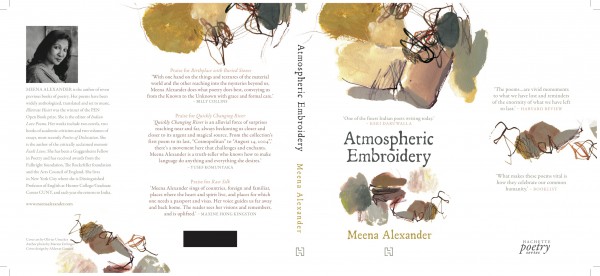Atmospheric Embroidery by Meena Alexander
Reviewed by Shikha Malaviya
In the 1990s, I discovered the poetry of Meena Alexander through her groundbreaking book, The Shock of Arrival: Reflections on Postcolonial Experience. At the time, I was constantly searching for alternative voices and experiences that echoed my own hyphenated identity as a British-born Indian American, a lived experience in which the mighty Mississippi, the regal Thames and the holy Ganges would merge. Through poems and essays that unapologetically embraced the excitement and disruption of dislocation while honoring cultural legacy and the right to question assimilation, The Shock of Arrival showed me there were several ways to write about migration and not just one “right” way. Alexander’s use of poetic images and metaphors of fracture and being torn brought to life the raw, rough-edged beauty of dislocation. The themes of loss, assimilation, and shifting identities make up the spinning globe from which Alexander’s poems emerge, one whose meridians she has been riding the past four decades, charting new territory while altering old ones.
In Atmospheric Embroidery, the author’s eighth book of poems, she continues this journey as witness and cartographer, drawing primarily from Christian and Hindu mythologies, revisiting the beginnings of her dislocation and assimilation into different lands. For example, Alexander, reflecting her own experience of having lived in India, Sudan, England and the US, explores Mappa, a series of embroidered maps of the world, created by Italian conceptual artist Alighiero Boetti. It is likely that Mappa inspires the book title and the title poem.
In the title poem, Alexander writes:
In Boetti’s embroidery, in his mapping of the world
Everything is cut and coupled,
Occult ordering – silk and painted steel
Sun and electric moon, butterfly and naked man.
Like Boetti, Alexander weaves cartographic tapestries of her own, with terrains often juxtaposed with the unlikeliest pairings, to create something new. In the poem, “Blue,” Alexander appeals to the Hindu Goddess of learning:
Saraswati of the broken seawall
Saraswati of raw eggs and slipshod girls
Goddess of the feverish tide
And storm-drunk saxophones
Speak to me.
There is a reverence for the numinous throughout the collection, opening with an incantation that evokes ancient Sanskrit shlokas. But instead of honoring and invoking the Gods, Alexander pays homage to the book.
Book with the word for love
In all the languages that flow through me
Book made of leaves from a mango tree
Book of rice paper tossed by monsoon winds
Book of pearls from grandmother’s wrist-“Fragment, In Praise of the Book”
Atmospheric Embroidery morphs the metaphor of migration, compounded out of memory, myth and varied landscapes from multiple homes. With each poem, Alexander reshapes micro journeys towards a poetic Pangea of sorts. In “Debt Ridden,” Alexander sets the tone of the book, by asking:
I.
Who are we?
Something was hopping
Up and down in my throat
O bullfrog
By the stream
Where I was born.
II.
How did we get here?
My mother had a pink
blouse
Over it her sari.
Something
Was torn.
Alexander’s work has always embraced this constant tussle between “who we are” and “how we got here,” along with the challenge of finding the right words. However, her poems in this collection particularly reveal a cartographer flitting in and out of childhood memories and distant lands, before being swallowed by the earth. Alexander revisits the mythic story of Sita, transported from ancient India to modern day Manhattan:
Sita bathed in sand.
By wildwort
And willowherb
Fire starts –
Dry ground cracks,
Swallows her whole.
Sita-found-in-a-field
We also find a vulnerable Cleopatra, hiding behind dark glasses, in a brilliant poem that fuses the ancient with the modern. Cleopatra, the voyeur spots Osiris, the Egyptian god of the afterworld, everywhere in New York city: stepping off the C train, strolling up Sugar Hill, telling her life and death will always coexist.
I cannot get him out of my mind, she whispers
To no one in particular.He is that lad and he is Osiris,
Come to live in me, part of the stumbling glory of things.-“Harlem Street”
One of the finest modern poets of the South Asian diaspora, Alexander writes in lyric free verse, with strains of more formal poetic traditions. At the same time, it is hard to pin down a particular style and technique in her work. Her imagery is vivid and the language sculpted in an ornate yet zen-like manner. There is much music in her verse and this lilting, lullaby quality that comes from the repetition of certain images, end rhymes, and questions that have a refrain-like quality.
In this collection, Alexander’s poetic landscape is one in which things are fragile and constantly torn: mother’s saree, Celan’s coat, skin, houses, wild grass, metal, pages, branches, wings, hands, ears, and more. This constant sense of tear represents the violence of being uprooted. After all these years, Alexander is still asking: ?
Who can write this?
Under Arcturus, Rubble of light.
We have no words
For what is happening –Still language endures
-“Night Theater”
The book is seventy-pages long and divided into five sections. Like Boetti’s embroidered maps, the poems in this slender volume are ornate and tactile. Loose threads of life and experience brush against your fingertips. You feel the fat seams of things that have been torn and stitched. You hear the voices of the young girl on the ship wanting to know where they are going and the poet who is growing older and wondering whether her poems matter.
Towards the end of Atmospheric Embroidery, one realizes that Alexander’s angst about dislocation is no longer dictated by the geographical or cultural, but rather by the metaphysical. In “No Rescue (With Toy Cars),” the poignant last poem, she ponders:
?You thought that by crossing all these seas
Writing all these poems something would happen.
But nothing has happened except that you have grown
Older; that is one part of it, the other the gods know
But keep quiet about.
In this collection, Meena Alexander gives us an atlas of poems, a book threaded with the silk of her life experience. To use her own words, this book is “alphabets burnt so the truth can be told/a book of singing grief/a book of reeds vanishing as light pours through.” (“Fragment, In Praise of the Book”).
![]()
 Shikha Malaviya (www.shikhamalaviya.com) is an Indo-American poet & writer. Her book, Geography of Tongues, was published in December 2013 and featured in several literary festivals. Shikha is a co-founder of The (Great) Indian Poetry Collective, a literary press dedicated to new poetic voices from India. Her work has been featured in Prairie Schooner, Water~Stone Review & other fine journals. Shikha was a featured TEDx speaker in GolfLinks, Bangalore, in 2013, where she gave a talk on poetry. She currently lives in the San Francisco bay area.
Shikha Malaviya (www.shikhamalaviya.com) is an Indo-American poet & writer. Her book, Geography of Tongues, was published in December 2013 and featured in several literary festivals. Shikha is a co-founder of The (Great) Indian Poetry Collective, a literary press dedicated to new poetic voices from India. Her work has been featured in Prairie Schooner, Water~Stone Review & other fine journals. Shikha was a featured TEDx speaker in GolfLinks, Bangalore, in 2013, where she gave a talk on poetry. She currently lives in the San Francisco bay area.




